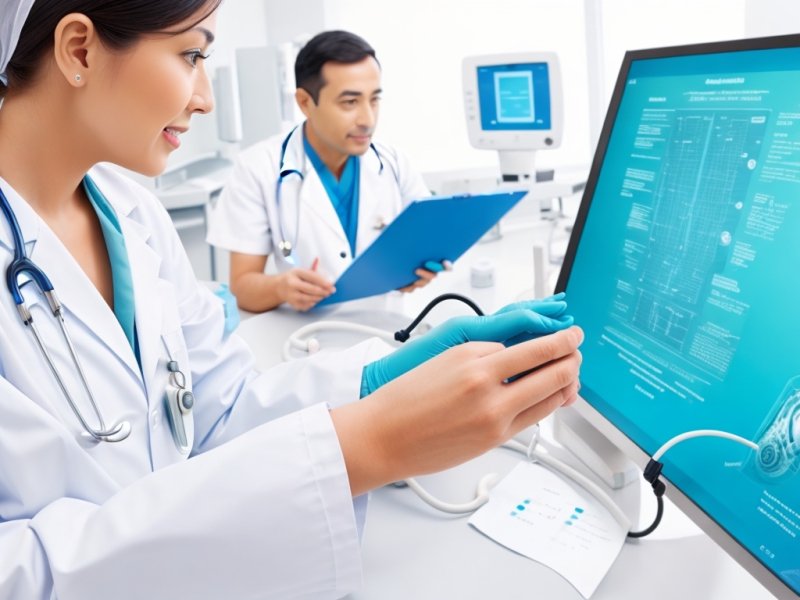
Introduction:
The field of medical technology has witnessed remarkable advancements in recent years, revolutionizing the way healthcare is delivered and improving patient outcomes. From innovative diagnostic tools to cutting-edge treatment methods, these technological breakthroughs have not only enhanced the accuracy and efficiency of medical procedures but have also transformed the overall healthcare landscape. In this blog post, we will explore some of the significant advancements in medical technology that are shaping the future of healthcare and revolutionizing patient care.
1. Artificial Intelligence and Machine Learning:
Artificial intelligence (AI) and machine learning (ML) have emerged as game-changers in the medical field. These technologies enable computers to analyze vast amounts of data and make accurate predictions, leading to more precise diagnoses and personalized treatment plans. AI-powered algorithms can interpret medical images, such as X-rays and MRIs, with remarkable accuracy, assisting radiologists in detecting abnormalities that might otherwise go unnoticed. Machine learning algorithms can also analyze patient data and medical records to identify patterns and predict disease progression, enabling early intervention and improved patient outcomes.
2. Telemedicine and Remote Patient Monitoring:
Telemedicine has gained significant traction, especially in the wake of the COVID-19 pandemic, transforming the way healthcare is delivered. With telemedicine, patients can consult with healthcare providers remotely, eliminating the need for in-person visits for non-emergency cases. This technology has enabled access to healthcare services in remote areas and improved patient convenience. Furthermore, remote patient monitoring devices, such as wearable sensors and mobile health apps, allow healthcare professionals to track patients' vital signs and health conditions in real-time. This continuous monitoring facilitates early intervention, prevents hospital readmissions, and empowers patients to actively participate in managing their health.
3. Precision Medicine:
Advancements in medical technology have paved the way for precision medicine, an approach that takes into account individual variability in genes, environment, and lifestyle for disease prevention and treatment. Genetic testing and molecular diagnostics enable healthcare professionals to identify genetic markers and biomarkers associated with specific diseases. This information helps tailor treatment plans that are optimized for each patient, ensuring higher efficacy and minimizing adverse effects. Precision medicine holds great promise for conditions such as cancer, where targeted therapies based on genomic profiling are showing significant success rates.
4. Robotics and Minimally Invasive Procedures:
Robotic-assisted surgeries have revolutionized the field of surgery, allowing for greater precision, smaller incisions, and faster recovery times. Surgeons can use robotic systems to perform complex procedures with enhanced dexterity and accuracy. Additionally, minimally invasive techniques, such as laparoscopy and endoscopy, have become increasingly common due to technological advancements. These procedures offer numerous benefits, including reduced pain, decreased risk of infection, shorter hospital stays, and quicker return to normal activities.
5. 3D Printing in Healthcare:
The advent of 3D printing technology has opened up new possibilities in healthcare. From personalized prosthetics and implants to tissue and organ regeneration, 3D printing has the potential to revolutionize patient care. Customized implants can be designed to fit a patient's unique anatomy, improving functionality and comfort. Moreover, bioprinting, a technique that combines living cells with 3D printing technology, holds promise for creating functional human tissues and organs, addressing the organ transplant shortage crisis.
Conclusion:
Advancements in medical technology are transforming healthcare outcomes by enabling accurate diagnoses, personalized treatments, and improved patient care. From AI and machine learning to telemedicine, precision medicine, robotics, and 3D printing, these innovations are revolutionizing the way healthcare is delivered. With further research and development, we can expect even more groundbreaking advancements that will continue to enhance the quality of care, extend lifespans, and improve the overall well-being of patients worldwide. As we embrace these technological advancements, it is essential to ensure ethical considerations, privacy, and data security to maximize the potential benefits while minimizing any associated risks.
Share This News